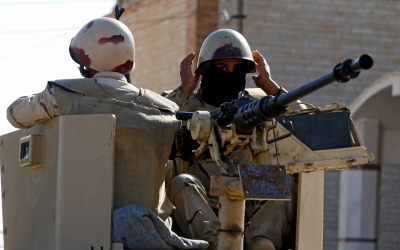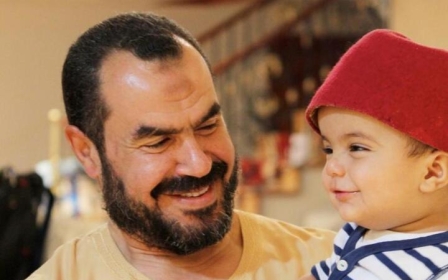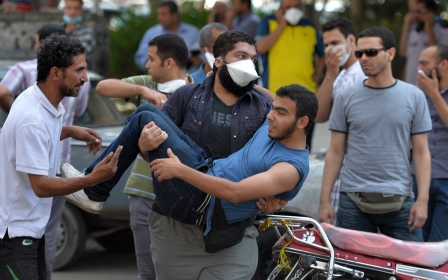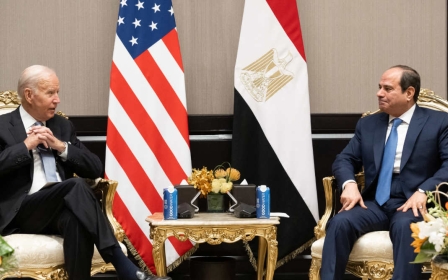Sinai shooting: Concerns raised over fate of 'forcibly disappeared' prisoners
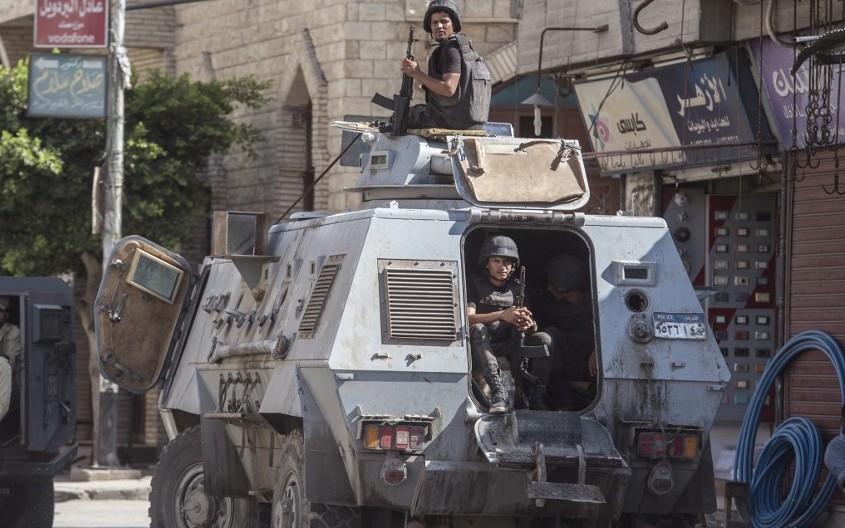
Campaigners have raised concerns about the fate of Egyptian detainees held at a Sinai facility where a shooting last month killed at least three security officers.
On 30 July, officers at the National Security headquarters in el-Arish, in the restive North Sinai province, came under attack from "extremist" inmates who seized their weapons during the transfer of four detainees, according to the Sinai Foundation for Human Rights (SFHR).
The attack led to deadly clashes between the detainees and security forces.
The Associated Press and Reuters cited security sources as saying that at least four police officers were killed, while the local Mada Masr news website said three died, including a senior officer.
SFHR said at least eight police officers were killed and more than 20 wounded.
New MEE newsletter: Jerusalem Dispatch
Sign up to get the latest insights and analysis on Israel-Palestine, alongside Turkey Unpacked and other MEE newsletters
The government has not released any statements on the circumstances surrounding the incident or the casualties.
Ahmed Salem, the executive director of SFHR, told Middle East Eye that the fate of an estimated 15 political detainees held on a floor where some of the clashes took place "remains uncertain".
“The prisoners are being held under unlawful conditions, as the National Security building lacks any form of judicial or government oversight,” Salim said.
He estimated that there are between 40 to 45 civilian detainees at the facility. He added that their detention circumstances amount to "enforced disappearance".
According to SFHR’s account of the incident, which MEE has not been able to verify, the incident started during the transfer of four detainees who were held on the second floor of the four-storey building.
Each of the floors holds different categories of prisoners. The first floor has “extremist militants”, the second holds those who are suspected of aiding them, and the third floor has “political prisoners”.
During the transfer, one of the inmates attacked a security officer and seized his weapon, then used it to attack the other officers and free the three fellow prisoners who also seized weapons from other officers.
The four then attacked security forces inside the building. The clashes then moved to the fourth floor where the militants sought shelter.
'The lack of official comments on the incident for more than two weeks reflects the authorities' lack of concern for the domestic public opinion and the families of detainees'
- Ahmed Salem, SFHR
Shortly afterwards, SFHR said central security forces were deployed in the area to deal with the situation. They fired tear gas at the third floor where the political detainees are held and where the militants who carried out the shooting were hiding.
Outside the building, there were security forces, ambulances, and firefighting vehicles. There was fire and smoke coming out of the windows of the third floor, SFHR said.
Internet and phone networks were briefly cut off from the area to prevent the publication of any documentation or photos on the internet using the phones of the deceased victims, SFHR said in a video explainer.
Ambulances transferred the bodies of eight victims - among them the head of the special operations force, Colonel Mohamed Mones - as well as 18 wounded soldiers, SFHR added.
According to AP, a list of casualties showed that the soldiers suffered both gunshots and breathing difficulties as a result of tear gas fired by security forces from outside of the building.
Call for transparency
Rights groups have denounced the absence of any official reactions to date.
“The lack of official comments on the incident for more than two weeks reflects the authorities' lack of concern for the domestic public opinion in Egypt or the families of detainees,” Salem told MEE.
“It is the responsibility of the Egyptian authorities to reveal the fate of the dozens of detainees inside the premises who were present during the armed clashes."
Meanwhile, the Egyptian Network for Human Rights said on Thursday that the authorities must respond to rumours suggesting a number of detainees have been subjected to "extrajudicial killings".
“Amid the media and human rights-imposed blockade on the Sinai Peninsula for years, and the difficulty in obtaining information about the situation there, the military spokesperson and the Ministry of Interior have become the primary sources of information,” the organisation said in a statement.
“The Egyptian Network reiterates its call to the Egyptian authorities to disclose the details of what happened inside the National Security headquarters and to issue a statement about the illegal treatment inflicted upon the detained civilians inside the premises.
“The Network holds the Egyptian authorities fully responsible for the safety and security of the citizens present within the National Security headquarters.”
The National Security headquarters is located in a heavily fortified area east of el-Arish, a restive area in North Sinai where the Egyptian army has been fighting an insurgency affiliated with the Islamic State (IS) group for years. A media blackout has been imposed on the area, effectively rendering it inaccessible to journalists and human rights groups.
Egypt's President Abdel Fattah el-Sisi, a former army general in office since 2014, declared a "war on terror" in North Sinai after ousting his democratically-elected civilian predecessor Mohamed Morsi in a military coup the previous year.
In February 2018, he escalated the operation by announcing a new offensive to "end terrorism" in the area, but since then, the army has yet to declare defeat or victory.
Arish city has been one of the focal points of the conflict, with hundreds of civilians and military personnel killed since the start of the 2018 operation.
Middle East Eye delivers independent and unrivalled coverage and analysis of the Middle East, North Africa and beyond. To learn more about republishing this content and the associated fees, please fill out this form. More about MEE can be found here.


